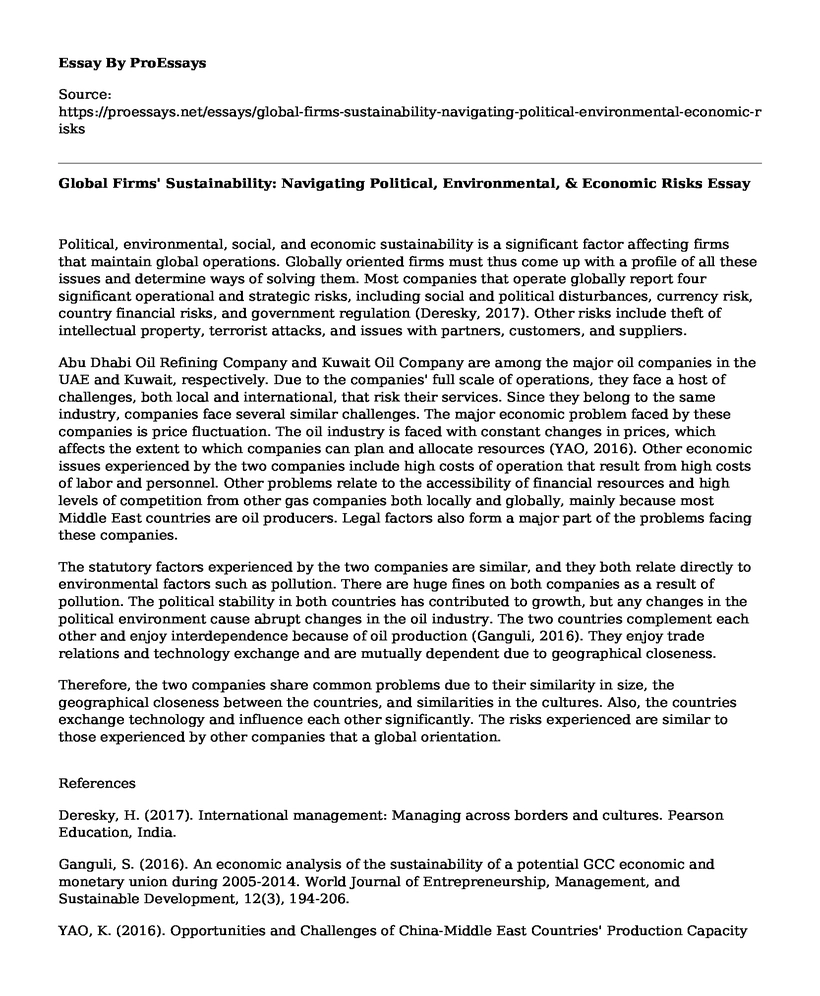Political, environmental, social, and economic sustainability is a significant factor affecting firms that maintain global operations. Globally oriented firms must thus come up with a profile of all these issues and determine ways of solving them. Most companies that operate globally report four significant operational and strategic risks, including social and political disturbances, currency risk, country financial risks, and government regulation (Deresky, 2017). Other risks include theft of intellectual property, terrorist attacks, and issues with partners, customers, and suppliers.
Abu Dhabi Oil Refining Company and Kuwait Oil Company are among the major oil companies in the UAE and Kuwait, respectively. Due to the companies' full scale of operations, they face a host of challenges, both local and international, that risk their services. Since they belong to the same industry, companies face several similar challenges. The major economic problem faced by these companies is price fluctuation. The oil industry is faced with constant changes in prices, which affects the extent to which companies can plan and allocate resources (YAO, 2016). Other economic issues experienced by the two companies include high costs of operation that result from high costs of labor and personnel. Other problems relate to the accessibility of financial resources and high levels of competition from other gas companies both locally and globally, mainly because most Middle East countries are oil producers. Legal factors also form a major part of the problems facing these companies.
The statutory factors experienced by the two companies are similar, and they both relate directly to environmental factors such as pollution. There are huge fines on both companies as a result of pollution. The political stability in both countries has contributed to growth, but any changes in the political environment cause abrupt changes in the oil industry. The two countries complement each other and enjoy interdependence because of oil production (Ganguli, 2016). They enjoy trade relations and technology exchange and are mutually dependent due to geographical closeness.
Therefore, the two companies share common problems due to their similarity in size, the geographical closeness between the countries, and similarities in the cultures. Also, the countries exchange technology and influence each other significantly. The risks experienced are similar to those experienced by other companies that a global orientation.
References
Deresky, H. (2017). International management: Managing across borders and cultures. Pearson Education, India.
Ganguli, S. (2016). An economic analysis of the sustainability of a potential GCC economic and monetary union during 2005-2014. World Journal of Entrepreneurship, Management, and Sustainable Development, 12(3), 194-206.
YAO, K. (2016). Opportunities and Challenges of China-Middle East Countries' Production Capacity Cooperation. Journal of Middle Eastern and Islamic Studies (in Asia), 10(2), 1-19.
Cite this page
Global Firms' Sustainability: Navigating Political, Environmental, & Economic Risks. (2023, Jan 25). Retrieved from https://proessays.net/essays/global-firms-sustainability-navigating-political-environmental-economic-risks
If you are the original author of this essay and no longer wish to have it published on the ProEssays website, please click below to request its removal:
- Leader Theory and Biblical Worldview - Essay Example
- The National Clas Standards in Health and Healthcare
- International Trade Logistics Essay
- Effects of Job Stress, Attitude, and External Market on Employees' Turnover
- Marxist Theory on Hamlet: Research Paper
- Paper Example on Maximizing Performance in Healthcare: Why Project Portfolio Management Matters
- Essay Example on Apple's Leadership Edge: How Steve Jobs Transformed Performance







